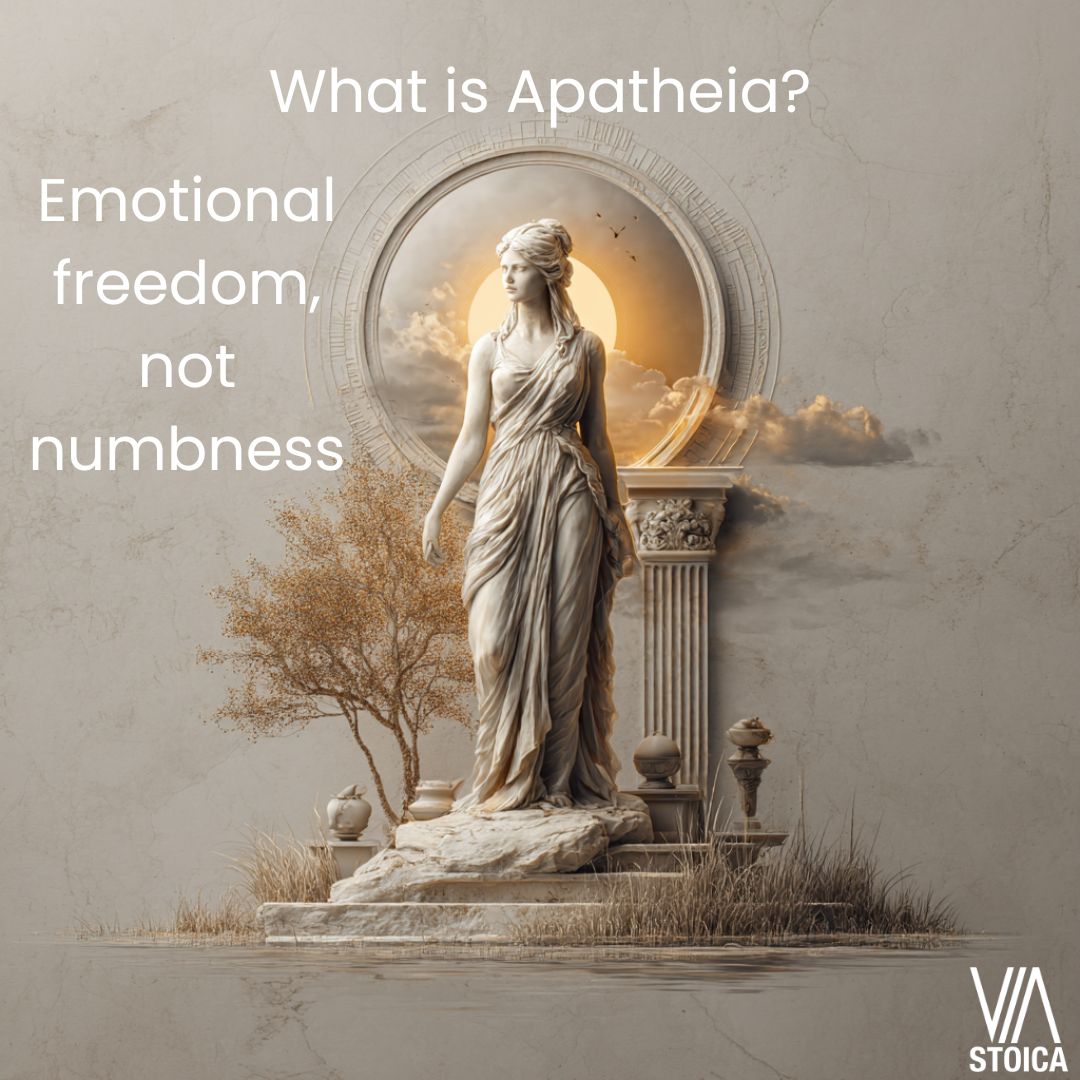What Is Apatheia? Why Stoic Emotional Freedom Is Not Emotional Numbness
Apatheia is an important concept in Stoicism and one that gives the philosophy a negative reputation. In modern times, we often equate this concept with being cold or uncaring. But in Stoicism, the ideal state of apatheia (ἀπάθεια) is not about being emotionless; it’s about being free. Free from the hold of destructive emotions. Free to act with wisdom, reason, and calm in the face of whatever fate sends our way.

This core Stoic concept is even more relevant in our modern lives, especially when the pressures of work, relationships, and comparisons stir up anxiety or frustration. Apatheia offers a different approach: one based on tranquility, resilience, and reasoned action.
The Word Behind the Wisdom
Greek spelling: ἀπάθεια
Root: Derived from a- (ἀ, “without”) + pathos (πάθος, “passion” or “suffering”)
At first glance, apatheia might sound like apathy, a lack of feeling or concern. But that’s a modern interpretation. For the Stoics, pathē were irrational, excessive emotional responses like rage, envy, or fear. These emotions arise from faulty judgments when we are mistaken in believing that something external is good or bad.
Apatheia, then, is not numbness. It’s the absence of irrational passions. It means living in harmony with nature and reason, responding to events with a calm and rational mind. It’s emotional mastery, not emotional suppression.
In fact, it is a state in which we can experience the Eupatheiai, the good emotions, like joy, wish, or caution. As Marcus Aurelius reminds himself of in his Meditations.
“Not to display anger or other emotions. To be free of passion and yet full of love.”
Marcus Aurelius, Meditations, Book 1.9
Key Dimensions of Apatheia
- Freedom from Inner Disturbance
You no longer react automatically to every loss, insult, or disappointment. You maintain equanimity, not because you suppress your emotions, but because you’ve trained your mind to evaluate them differently. - Clear Judgment and Action
In apatheia, you respond to life from reason, not impulse. You pause, reflect, and act with integrity rather than being swayed by anger or desire. - Emotional Alignment with Nature
You still feel care, joy, or sadness, but your emotions are aligned with what is rational and appropriate, not excessive or self-defeating. You can now be in tune with the Eupatheiai, the good feelings.
Core Stoic Principles Behind Apatheia
- Virtue (ἀρετή): True good lies in the excellence of character. Apatheia helps preserve virtue by preventing passions from corrupting our actions.
- Reason (λόγος): Human beings are rational animals. Apatheia is the state in which reason governs our inner world.
- Nature (φύσις): To live according to nature is to live in accordance with rational order. A disordered emotional life contradicts this aim.
- Wisdom (σοφία): The wise person recognizes what is and isn’t up to them. Apatheia emerges from this clarity.
Common Misunderstandings
- Apatheia vs. Apathy
Apathy, in the modern sense, means indifference or disinterest. Apatheia in Stoicism is something else entirely, it is active engagement with life through reasoned detachment from irrational impulses. - Not the End of Feeling
Stoics still feel affection, love, and moral outrage, but they don’t let those emotions cloud their judgment or control their actions.
Why Apatheia Matters in Stoicism
For the Stoics, apatheia was the hallmark of the sage; someone who had mastered themselves. Epictetus said that we must train ourselves not to be carried away by our impressions, while Seneca described it as a mind that is tranquil and fearless, and steadfast.
Marcus Aurelius offers a lived example of this practice: in Meditations, he reminds himself not to be overcome by passion as though it were a catastrophe, but to hold fast to reason.
Stoic training is about progress, not perfection. Most of us will never become sages. But every step toward apatheia brings us closer to freedom and peace.
How to Practice Apatheia Today
- Journaling Prompt
Reflect each evening: Which emotions took hold of me today, and were they based on mistaken judgments? - Daily Mindset Check
Before reacting: Is this within my control? Is my response in line with reason? - Role Reversal Exercise
When irritated, pause and imagine yourself in the other person’s position. Would a wise person lose their calm here? - Practice Voluntary Discomfort
Skip a comfort, like coffee or your phone, for a day. Learn to respond, not crave.
FAQ
What does apatheia mean in Stoicism?
It refers to the absence of irrational passions and the presence of inner calm and joy guided by reason.
Is apatheia the same as being unemotional?
No. It means not being controlled by emotions, not the absence of emotion altogether.
Can anyone develop apatheia?
Yes, with consistent practice, reflection, and training in Stoic principles.
Conclusion
Apatheia is not about becoming unemotional. It’s about becoming emotionally balanced and wise. In a world that thrives on outrage and overstimulation, this Stoic state of composure is more required than ever. You don’t need to master it overnight. Each calm response, each moment of clear judgment, is a step on the path.
Want to explore more Stoic strategies?
Book a free consultation with one of our Stoic Coaches or learn about more Stoic philosophy terms. You can also listen to the Via Stoica podcast on Spotify or Apple Podcasts, or watch it on YouTube.
Author Bio
Benny Voncken is the co-founder of Via Stoica, where he helps people apply Stoic philosophy to modern life. He is a Stoic coach, writer, and podcast host of The Via Stoica Podcast. With almost a decade of teaching experience and daily Stoic practice, Benny creates resources, workshops, and reflections that make ancient wisdom practical today.
Related Posts
-
 Inner Life Terms
Inner Life TermsWhat Are Values? Principles That Guide Action and Display Nature
What are Values? Most people don’t wake up thinking about their values. They notice them indirectly, when something feels slightly misaligned. When a choice looks right on paper but leaves a faint sense of resistance. When success arrives, yet doesn’t land the way it was expected to. Values are often mistaken for opinions, preferences, or […]
Read more -
 Via Stoica Podcast
Via Stoica PodcastA Stoic Conversation with Jason Nelson: Six Seeds for a Happier Life
What if happiness is not something you achieve one day, but something you practice every day? In A Balm for Your Soul: Six Seeds for Happiness, Jason Nelson offers a grounded and humane answer to a question many people quietly struggle with: Why does life still feel off, even when things look good on paper?Rather […]
Read more -
 Greek Stoic Philosophy Terms
Greek Stoic Philosophy TermsWhat Is Philanthropia? How Stoicism Views Love for Humankind
What Is Philanthropia? Philanthropia in Stoicism is the cultivated disposition to care for human beings simply because they are human. It describes a rational, practiced goodwill toward others that flows from understanding our shared nature, rather than from emotion, obligation, or reward. This concept matters today because modern life often treats kindness as optional, sentimental, […]
Read more


Comments 0